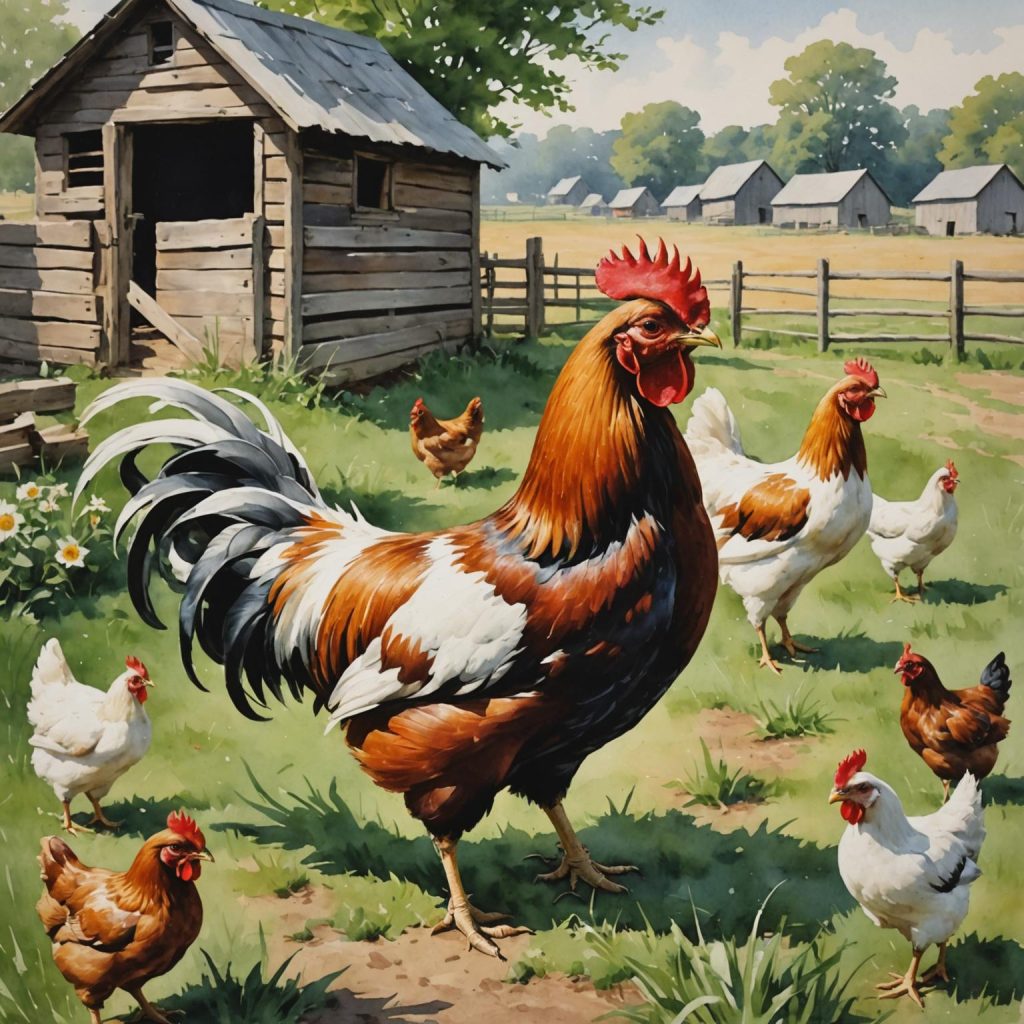When it comes to raising chickens, choosing the right breed is crucial. There are many different breeds to choose from, each with its own unique characteristics and traits. Some breeds are known for their egg-laying abilities, while others are prized for their meat production. It’s important to consider your specific needs and goals when selecting a breed. For example, if you’re primarily interested in egg production, you might want to consider breeds such as the Rhode Island Red or the Leghorn, which are known for their high egg yields. On the other hand, if you’re looking for a dual-purpose breed that can provide both eggs and meat, breeds like the Plymouth Rock or the Sussex might be a better fit. Additionally, some breeds are better suited to cold climates, while others thrive in warmer environments. It’s important to research the different breeds and consider factors such as climate, space, and available resources before making a decision.
In addition to considering the practical aspects of raising chickens, it’s also important to think about the temperament and personality of the breed. Some breeds are known for being docile and friendly, making them great choices for families with children or first-time chicken owners. Other breeds are more independent and can be more challenging to handle. It’s important to consider your own experience level and comfort with handling chickens when choosing a breed. Ultimately, the right breed for you will depend on your specific needs, goals, and preferences. By taking the time to research and consider all of these factors, you can ensure that you choose a breed that is well-suited to your individual circumstances.
Table of Contents
Coop and Run Setup
Once you’ve chosen the right breed for your needs, it’s important to set up a suitable coop and run for your chickens. The coop is where your chickens will roost at night and lay their eggs, so it’s essential to provide a safe and comfortable environment for them. When designing a coop, it’s important to consider factors such as ventilation, insulation, and predator protection. Good ventilation is crucial for maintaining air quality and preventing moisture buildup, which can lead to respiratory issues in chickens. Insulation is also important, especially in colder climates, to help regulate temperature and keep your chickens comfortable. Additionally, it’s essential to ensure that the coop is secure and predator-proof to protect your chickens from potential threats such as foxes, raccoons, and birds of prey.
In addition to the coop, it’s important to provide a suitable outdoor run for your chickens to roam and forage. The run should be spacious enough to allow your chickens to move around freely and engage in natural behaviors such as scratching and dust bathing. It’s also important to provide shade and shelter within the run to protect your chickens from the elements. Additionally, it’s essential to consider factors such as fencing and security to prevent escapes and protect your chickens from predators. By taking the time to set up a suitable coop and run, you can provide a safe and comfortable environment for your chickens to thrive.
Feeding and Nutrition
Feeding and nutrition are essential aspects of raising healthy and productive chickens. A balanced diet is crucial for supporting egg production, maintaining overall health, and promoting strong immune systems. When it comes to feeding chickens, it’s important to provide a high-quality commercial feed that is specifically formulated for poultry. This feed should contain essential nutrients such as protein, carbohydrates, vitamins, and minerals to support overall health and egg production. Additionally, it’s important to provide access to fresh water at all times to prevent dehydration and support proper digestion.
In addition to commercial feed, it’s important to supplement your chickens’ diet with fresh fruits and vegetables, as well as occasional treats such as mealworms or scratch grains. These treats can provide additional nutrients and help keep your chickens engaged and entertained. It’s also important to provide access to grit, which helps chickens digest their food by grinding it in their gizzards. Additionally, if you’re raising laying hens, it’s important to provide access to oyster shell or another source of calcium to support strong eggshells. By providing a balanced diet that meets all of your chickens’ nutritional needs, you can ensure that they stay healthy and productive.
Health and Wellness
Maintaining the health and wellness of your chickens is essential for their overall well-being and productivity. Regular health checks are crucial for identifying any potential issues early on and preventing the spread of disease within your flock. It’s important to monitor your chickens for signs of illness or injury, such as changes in behavior, decreased appetite, or abnormal droppings. Additionally, it’s essential to provide regular preventative care such as vaccinations and parasite control to protect your flock from common diseases and pests.
In addition to preventative care, it’s important to provide a clean and sanitary environment for your chickens. Regularly cleaning the coop and run can help prevent the buildup of bacteria and parasites that can lead to illness. It’s also important to provide proper ventilation and access to clean water at all times to support overall health. Additionally, it’s essential to provide proper nutrition and access to fresh air and sunlight to support strong immune systems.
Egg Production and Collection
Egg production is one of the primary reasons many people choose to raise chickens. To maximize egg production, it’s important to provide a suitable environment that supports natural behaviors such as nesting and roosting. It’s essential to provide nesting boxes within the coop where your hens can lay their eggs in a safe and comfortable environment. These nesting boxes should be filled with clean bedding material such as straw or wood shavings to provide a cozy spot for your hens to lay their eggs.
In addition to providing suitable nesting boxes, it’s important to collect eggs regularly to prevent them from being damaged or eaten by predators. It’s best to collect eggs at least once a day, preferably in the morning or early afternoon when they are still fresh. It’s also important to handle eggs carefully to prevent cracking or contamination. By providing a suitable environment for egg production and collecting eggs regularly, you can ensure a steady supply of fresh eggs for your household.
Handling and socializing your chickens is an important aspect of raising them. By spending time with your chickens and handling them regularly, you can help them become more comfortable around humans and less skittish. This can make it easier to perform routine tasks such as health checks or collecting eggs. Additionally, socializing your chickens can help reduce stress and aggression within the flock.
When handling chickens, it’s important to approach them calmly and gently to avoid causing unnecessary stress or injury. It’s best to start handling chicks from a young age so they become accustomed to human interaction early on. Additionally, it’s important to provide opportunities for socialization within the flock by introducing new birds gradually and monitoring their interactions. By taking the time to handle and socialize your chickens regularly, you can help them become more comfortable around humans and each other.
Common Challenges and Solutions
Raising chickens comes with its own set of challenges, but with proper knowledge and preparation, these challenges can be overcome. One common challenge is predator attacks, which can pose a serious threat to your flock if not properly addressed. To prevent predator attacks, it’s important to secure the coop and run with sturdy fencing and locks. Additionally, providing adequate lighting around the coop can help deter nocturnal predators such as raccoons or foxes.
Another common challenge is maintaining a clean environment within the coop and run. Regular cleaning is essential for preventing the buildup of bacteria and parasites that can lead to illness within the flock. It’s important to remove soiled bedding regularly and provide fresh bedding material as needed. Additionally, providing proper ventilation within the coop can help prevent moisture buildup that can lead to respiratory issues in chickens.
In conclusion, raising chickens can be a rewarding experience when done properly. By choosing the right breed, setting up a suitable coop and run, providing proper nutrition and healthcare, supporting egg production, handling and socializing your chickens regularly, you can ensure that they stay healthy and productive. While there may be challenges along the way, with proper knowledge and preparation these challenges can be overcome. By taking the time to research and consider all of these factors, you can ensure that you raise happy and healthy chickens that provide you with fresh eggs for years to come.
Meet Walter, the feathered-friend fanatic of Florida! Nestled in the sunshine state, Walter struts through life with his feathered companions, clucking his way to happiness. With a coop that’s fancier than a five-star hotel, he’s the Don Juan of the chicken world. When he’s not teaching his hens to do the cha-cha, you’ll find him in a heated debate with his prized rooster, Sir Clucks-a-Lot. Walter’s poultry passion is no yolk; he’s the sunny-side-up guy you never knew you needed in your flock of friends!







